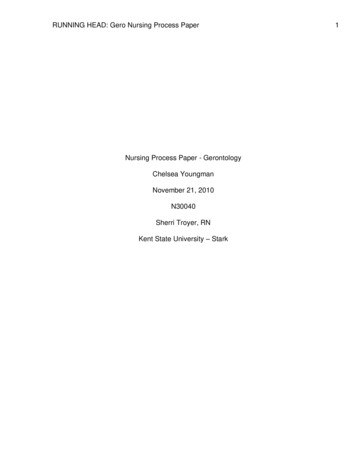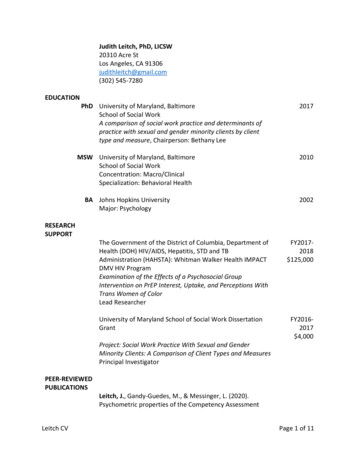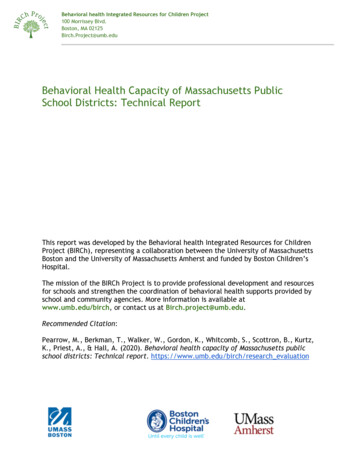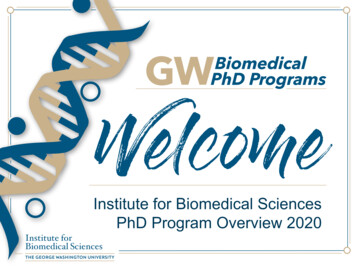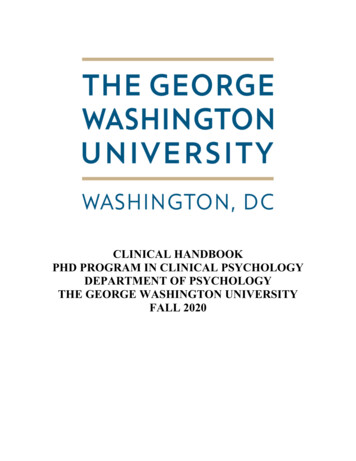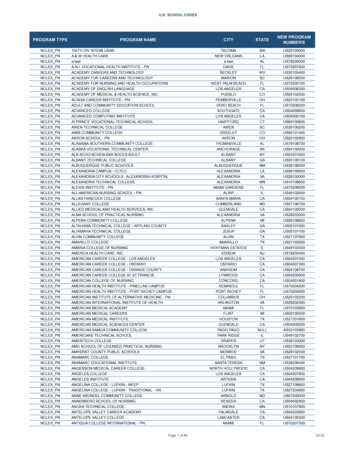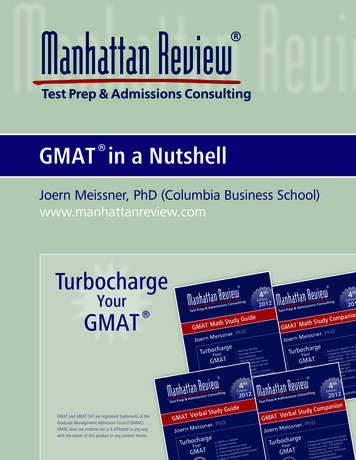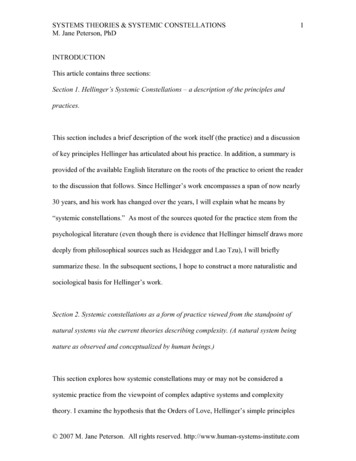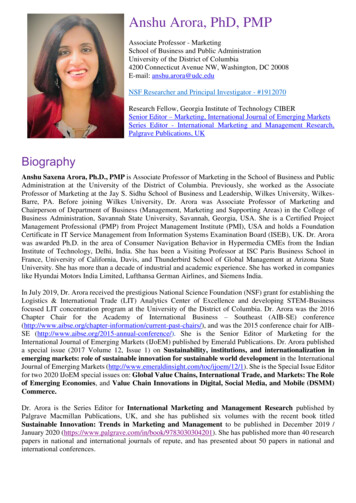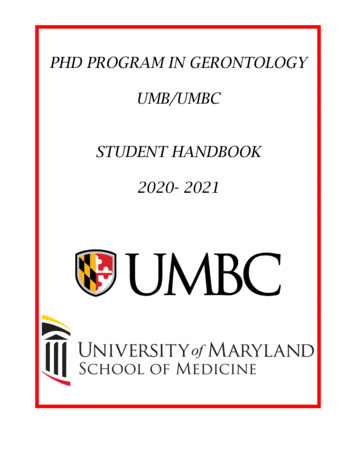
Transcription
PHD PROGRAM IN GERONTOLOGYUMB/UMBCSTUDENT HANDBOOK2020- 2021
The PhilosophyThe Doctoral Program in Gerontology is an intercampus, interdisciplinaryresearch degree program at the University of Maryland, Baltimore (UMB) and Universityof Maryland, Baltimore County (UMBC).The program provides an interdisciplinary and integrative perspective on theprocess of human aging and the experiences of growing old. The approachacknowledges the complex, dynamic, and bi-directional relationships among individualsand the historical, political, economic, environmental, psychological, social, cultural andbiological contexts in which aging occurs.The goal of the program is to train a new generation of gerontology scholarsconversant with interdisciplinary and integrative paradigms and research designsemployed to examine the unique, reciprocal, and dynamic nature of aging in context.UMB’s six professional schools (dental, law, medicine, nursing, pharmacy, andsocial work) and UMBC's College of Arts, Humanities and Social Sciences departments(public policy, psychology, and sociology & anthropology) combine to make this missionpossible by offering three tracks of study: aging policy issues, epidemiology ofaging, and social, cultural, and behavioral sciences.The program benefits from its close proximity to federal agencies located in theBaltimore/Washington metropolitan area such as the Social Security Administration,Administration on Aging, Department of Health and Human Services, National Institutesof Health, and the Center for Medicare & Medicaid Services (CMS), as well asnumerous private and non-profit organizations dedicated to age-related programs andpolicy, research and service.1
DirectorsDenise Orwig, PhDDirector UMBHoward Hall, 203660 W. Redwood St.Baltimore, MD 21201410-706-2406dorwig@som.umaryland.eduJohn Schumacher, PhDDirector UMBCUMBCPUP 2171000 Hilltop CircleBaltimore, MD 21250410-455-3184jschuma@umbc.eduAdministrative StaffJustine Golden, MAProgram ManagerGerontology PhD Program, UMB660 W. Redwood St.Howard Hall, 222Baltimore, MD 21201410-706-4926 office410-706-4433 fax443-691-4435 celljgold002@umaryland.eduJulie RosenthalProgram Mgmt. SpecialistUMBCPUP 2501000 Hilltop CircleBaltimore, MD 21250410-455-2081 office410-455-1154 faxjulier@umbc.edu2
Academic InformationThe following are highlights from the Graduate School Catalog and Student Answer Book.Further details on policies can be accessed in the print catalog or on line at the addresses below.UMB catalog: http://www.graduate.umaryland.edu/policies/UMBC catalog: https://catalog.umbc.edu/index.php?catoid 24Academic StandardsStudents are expected to meet the highest standards of academic integrity. Plagiarism, fabrication,falsification, cheating, and other acts of academic dishonesty, or abetting the academic dishonesty ofanother will result in sanctions and may lead to academic dismissal. Further details on this policy areincluded in the catalog.Appealing Academic DismissalIf dismissed for poor academic performance, students can refer to "Appeal of Academic Dismissal" policy.If dismissed for cheating etc, refer to the Student Academic Misconduct Policy. Both are available at theoffice of the Dean of the Graduate School and the office of the Vice President for Academic Affairs.Grades (refer to the Program Information section for more detail)All graduate students must earn at least a 3.0 in each semester or they are subject to academic jeopardyand dismissal without a degree. No transfer credit will be given for a course in which a grade less than“B” was earned.Since graduate students must maintain an overall "B" average, every credit hour of "C" in course workmust be balanced by a credit hour of "A." However, a grade of "A" in thesis or dissertation research willnot balance a grade of "C" in a course, nor will an "A" in transfer credit balance a "C" in a course. Acourse in which a grade less than "B" is received may be repeated. Courses in the student’s designateddegree program that are completed with a "D" or an "F" must be repeated.Some schools on the UMB campus use the /- system: A, A-, B , B, B-, C , C, C- D , D, D-, and F.Please note, if a ' ' or '-' is given it may not be reflected in the transcript because not allschools/campuses use this system.Required creditsA full-time graduate student must be officially registered for 9 credits per semester.Please note that if you have student loans from a previous degree you must register for 6 or more creditsof coursework each semester until you graduate.Schedule AdjustmentsAdd/DropUMBAdd: by the end of the 1st week onlyDrop: Weeks 1-3 allowed to drop with no notation on transcript. Weeks 4-8 drop with a ‘W’ on transcript.Weeks 9 on either have an Incomplete WP or WF on transcript.UMBCCourses may be added through the first week of classes. The last day a student may drop a coursewithout penalty of failure is eight weeks after instruction begins. However, your refund for the course isreduced a percentage every day after the first day of classes. There is no withdraw pass or withdraw fail.Simply, Withdraw.Withdrawal from the programIf you choose to leave the program after registration you must fill out a Withdrawal Form.Leave of Absence (LOA)A leave of absence can be taken for a semester or a year with the approval of the academic advisor andthe Graduate School. The amount of time to graduation is not extended if you take a LOA.3
Time RequirementsAll students must have a minimum of 3 years of full-time graduate study at the University of Maryland.Students must be admitted to candidacy within 5 years of admission to the doctoral program and at least2 full sequential semesters before graduating. All degree requirements must be completed within 4 yearsof candidacy and no more than 9 years after admission to the program (for full-time and part-timestudents).Admission to Candidacy (refer to the Program Information section for more detail)A student must be admitted to candidacy within five years after admission to the doctoral program. Astudent must be admitted to candidacy at least two full sequential semesters (spring, summer or fall)before the date on which the doctoral degree will be conferred.Doctoral students must complete an application for admission to candidacy, in duplicate, when they fulfillall requirements for candidacy. A graduate record form delineating all course work taken by the student infulfillment of degree requirements must accompany each copy of the application.Students must complete all their program requirements for the degree, including the dissertation and finaloral examination, within four years after admission to candidacy.Dissertation Examination Committee (refer to the Dissertation section for more detail)The final oral defense of the dissertation is conducted by an examination committeerecommended by the graduate faculty advisor and approved by the Dean of the Graduate School.The Nomination of Members for the Final Dissertation Examination Committee form is submittedby the advisor at least six months before the date of the final examination. The committee willconsist of a minimum of five voting members. At least three of these will be regular members ofthe graduate faculty. At least one of the five will hold an appointment in a program external to theone in which the student is seeking the degree.Dissertation (refer to the Dissertation section for more detail)The ability to do independent research must be demonstrated by an original dissertation on a topicapproved by the department or program graduate committee.Authorization for publication of all or a portion of the dissertation prior to its defense and approval by thegraduate faculty examining committee should be discussed between the student and the researchadvisor. Further authorization from the dean of The Graduate School is unnecessary. All dissertations aresubmitted electronically.FICA DeductionThe state of Maryland requires that in order to be FICA exempt, the student must be enrolled and activelyattending class. Since the summer break is not considered a “short break” according to the IRSregulations, the FICA status for Graduate Assistants may be impacted if they are not enrolled duringsummer sessions for at least 3 credits for each session.FERPAUMBC and UMB adhere to a practice of compliance with the Family Educational Rights and Privacy Act(FERPA or the Buckley Amendment). As such, it is the practice to (1) to permit students to inspect theireducation records (2) to limit disclosure to others of personally identifiable information from educationrecords without student's prior written consent, and (3) to provide students the opportunity to seekcorrection of their education records where appropriate.For further detail:UMBC: y-and-the-release-of-education-records/UMB: ion RequirementsThe Application for Diploma form must be filed with the Graduate School within the first three weeks ofthe semester in which the candidate expects to obtain a degree. Diplomas will be issued at the end ofeach semester. You must be registered for at least 1 credit in the semester in which you graduate.If you do not graduate as anticipated, you must notify the Office of the Registrar and the GraduateSchool. You must file another Application for Diploma for the semester in which you do graduate.4
Graduate Research Assistantships (refer to the Program Information section for more detail)A 20-hour/week commitment is expected in exchange for a stipend, tuition remission, and/or healthinsurance. No other job or funding, either at the university or elsewhere, is permitted while astudent is supported by a full-time GRA. No summer work may be undertaken without graduateschool permission.5
Program InformationAll students must follow and achieve graduate school requirements as stated in the graduate schoolcatalog. In addition, students must abide by the following program requirements and policies.Academic Integrity Training (required training) Due by September 13th.There are 5 modules.At the end, PDF your grades and email the PDF to your Academic ntegrity/Admission to CandidacyTo achieve candidacy, the student must:1) Successfully complete all 7 core courses2) Pass all comprehensive exams3) Successfully complete at least 15 credits of additional course work toward the methods/statistics andtrack requirements of the program, to include 6-9 credits from the methods/statistics courses and 6-9credits from track courses.Candidacy is usually applied for in the student’s 3rd year [full-time].You must apply for Admission to Candidacy by completing the Application form from your primary campusand attaching the Graduate School Record Form and/or unofficial transcript. This is then given to thecoordinator for review. The coordinator will get the appropriate signatures and submit the paperwork.UMB does not allow any Incompletes or “No Marks” when applying for candidacy.UMBC does allow these, but they are highly discouraged.Academic advisors vs. other advisorsAn academic advisor is assigned upon entry into the program. This advisor assists the student withfulfilling the program's academic requirements. He/She may be either an associate or regular graduatefaculty member. This advisor may be changed upon request from the student if a better fit is needed.Later in a student’s progression, the role of the advisor may be transferred to the research mentor (bymutual agreement), as the student moves into the dissertation phase. Students should inform theProgram if their research mentor will also be serving in the role of academic advisor.A GRA/TA supervisor is usually assigned by the program. A student is placed in a GRA or a TA positionprimarily for funding reasons. The directors try to assign by interests, but at times such placements areprimarily made to provide a stipend to the student. The GRA/TA supervisor (or their coordinator) helpsguide the student to complete their assigned GRA/TA tasks. The supervisor could become the academicadvisor or the research mentor, if the student desires and requests this change. Just because a student isworking on someone’s grant does not mean the student must work in this topical area or use this data fordissertation research. If the student feels the GRA supervisor is pushing them to modify their researchinterest toward her/his own, please discuss this with the program coordinator and directors.A research mentor is a regular member of the graduate faculty who mentors a student in their specificresearch interest for the dissertation. The student chooses who best fits their interests and will help themmove forward with their dissertation and professional development. Most likely this research mentor willserve as dissertation chair and work with the student to develop a student-specific question forcomprehensive exams. The research mentor is never assigned. The research mentor could be theacademic advisor or the GRA/TA supervisor, but does not have to be.A dissertation chair is chosen by the student. The chair is a regular graduate faculty member who willguide the student through their dissertation. The student chooses this person by who best fits theirresearch interests and whom they work with best. The dissertation chair may also be the researchmentor, if desired by the student.6
Aging ForumThe forum is a gathering of all the gerontology doctoral students to: 1) introduce the research being doneby doctoral program faculty, 2) provide sessions on the “nuts and bolts” of research and life in theacademic world, and 3) empower the students to discuss topics of interest to them.The Forum will meet twice a month for 1.5 hours. First and second year students are required toattend. Students in their third and fourth years are expected to attend. Students and faculty worktogether to set the agenda.CITI Training (required training) Due by August 25thProtection of human subjects pCreate an account by clicking Register.Once logged in Select Social & Behavioral Minimal Risk ResearchPDF the certificate to your Academic searchers/required-training/Click on Access the CITI Training WebsiteCreate an Account by clicking RegisterAssociate with University of Maryland, BaltimoreYou MUST take the Biomedical coursePDF the certificate to your Academic CoordinatorCompetenciesA list of required goals for each student in the program is listed in the back of the handbook. These arereviewed during your End of Year Review each year.Comprehensive Exams (See the Comprehensive Exam section for more detail)The earliest the exam can be taken is after the student has successfully completed the seven corecourses (epidemiology of aging, biology of aging, psychological aspects of aging, socioculturalgerontology, issues in aging policy, and the 2 semester theory and methods sequence). For full-timestudents, this would be mid-July after their second year. A student may begin work on a dissertationproposal prior to passing the exam, but must pass the exam prior to defending the dissertation proposal.-A timed practice exam is required. It may be offered either in early January or during spring break of your2nd year.-Sample questions can be found on the Gerontology PhD Program page on the UMBC Blackboard site.ConferencesThe Program highly suggests each student attend at least one conference yearly. Choose the conferencethat is most highly regarded for your track. It is highly suggested that you begin presenting at aconference in your 2nd year.Deadlines and RSVPsEach student signs an award letter or enrollment letter for each academic year. In this letter it states,“In order to be in good standing with the program and able to matriculate, you must submit all paperworkby the provided deadlines throughout the year.” This means, each students submits all paperwork,registers online, RSVPs etc. by stated due dates.Dissertation (See the Dissertation section for more detail)A student may, with advisor permission and after completing the ethics course, start to take dissertationhours before comprehensive exams, GERO 898.Two types of dissertation credits.Register for GERO 898 to take dissertation credits before he/she reaches candidacy. Thesecredits do NOT count toward your required dissertation credits. You must work with a faculty member.GERO 899 is required after a student is approved for candidacy.7
To determine faculty for committees please refer to the program website.Electronic Dissertations are required by the program at both campuses.Be sure to ask Justine for deadlines and forms once you defend your proposal.Dual DegreesA student may apply and earn a dual degree in either epidemiology or applied sociology. Please see thesection below on Dual Degrees for exact rules.EmailYou may ONLY use your campus email (UMB must use SOM email) while in the program to assure youare HIPAA compliant with research related emails and to assure all emails are protected by university firewalls.You MUST read your email once a day everyday while a student in the program.Ethics CourseCIPP 909, Responsible Conduct in Research, is offered every spring and taught by Dr. Shamoo. Youregister for 1 credit; you only attend until spring break.Shortly after the semester course there will be a 1-2 hour session on ethics specifically relating toresearch with an older population.This ethics course must be successfully completed before any dissertation work is undertaken (typicallyby the spring of your 2nd year) and before you defend your dissertation proposal.Faculty Document Review TimeWhenever an item is submitted to faculty for review (e.g. annual review, poster abstract) you must allowthem at least 2 weeks for review. This does not pertain to coursework deadlines.FICA DeductionUMBC students must enroll for the summer. Please look for emails each April from the coordinator withdirections on how to enroll. The program is not responsible for paying your FICA if you are late registeringor turning in forms.UMB students register for ABGA 900 for 7 credits on SURFS.UMBC students register for GRAD 601, 5 credits each fall and spring and Grad 601 and 1 credit ofindependent study for summer.FundingThe program's commitment is to fund students in their first year and to make every effort to providefunding in the second year. Such funding may involve state and/or extramural research assistantships (tousually include a 12 month stipend, tuition up to 10 credits/semester, and student only health benefits).Every effort will be made to fund students for subsequent years in the program; however, such funding iscontingent on grant funds and the match of faculty and student research interests. As such, students areencouraged to work with their advisors to secure funding beyond their first year in the program. Also,please note, that the commitment of funding is dependent on the student successfully progressing in theprogram.GCP Training due by August 26thNIH-funded investigators and clinical trial site staff who are responsible for the conduct, management andoversight of NIH-funded clinical trials are required to be trained in Good Clinical Practice. GCP trainingmust be refreshed at least every three years in order remain current with regulations, standards dfPDF your certificate to your Academic CoordinatorGerontology Early Career Development AwardThis prestigious award recognizes excellence in the student’s academic work and in research, whichserves as the foundation for becoming an independent scholar in the field of gerontology.8
The fund provides merit-based awards to students in the Doctoral Program in Gerontology, and supportsdissertation research awards, travel
UMBC PUP 217 1000 Hilltop Circle Baltimore, MD 21250 410-455-3184 jschuma@umbc.edu Administrative Staff Justine Golden, MA Program Manager Gerontology PhD Program, UMB 660 W. Redwood St. Howard Hall, 222 Baltimore, MD 21201 410-706-4926 office 410-706-4433 fax 443-691-4435 cell jgold002@um
